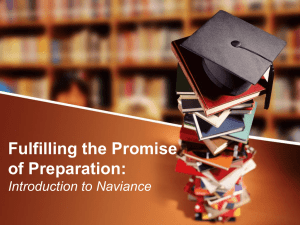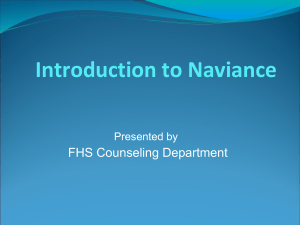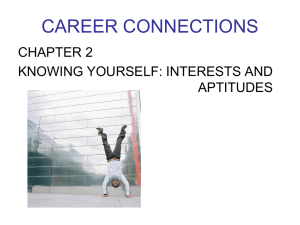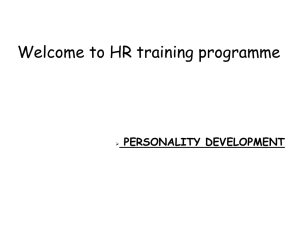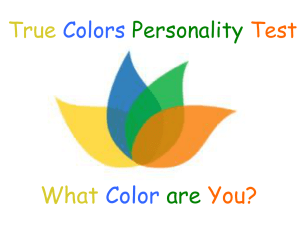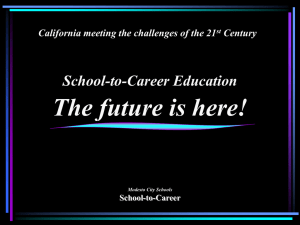10th Grade Career Exploration
advertisement
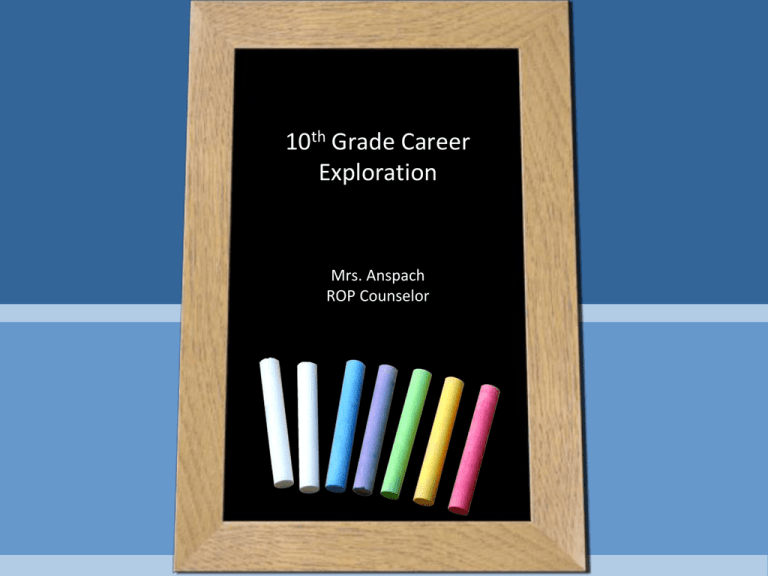
10th Grade Career Exploration Mrs. Anspach ROP Counselor Career Center, Rm. 292 Mrs. Megen Anspach R.O.P. Counselor Assistance with: Registering for ROP classes Exploring career interests Developing interview skills Writing a resume Completing job applications College & Career Planning Peer Tutoring 2 REGIONAL OCCUPATIONAL PROGRAM What is ROP? Who Should Enroll? Learning skills for college and career success. Obtaining internship/work experience (OJT). Exploring Career Interests. Students 16 or older (*exceptions). Students in grades 10-12. Students who learn better by doing. Students wanting to explore a career field. Students wanting to earn elective credit. 3 WHY SHOULD YOU ENROLL IN ROP? • Expand your educational options • “Pre-test” career interests before college • Helps you acquire lifelong skills & habits to apply to any career Self-confidence Self-awareness Good work habits Practical problemsolving Personal Responsibility Teamwork Punctuality Reliability Cooperation 4 BHHS Course Offerings: •Broadcast Communication Studies •Culinary Arts, Intro & Advanced •Desktop Publishing •Entrepreneurship •Fashion Technology •Film & Video Production 1 & 2-UC •Hotel Management •Office Occupations •Peer Tutoring •Principles in Education-UC •Psychology & Counseling Principles-UC •Robotics •Sports & Entertainment Marketing •Sports Medicine-UC •T.V. Production 5 University (Doctorate) Vocational Junior college Technical School University School (graduate) University (Undergraduate) High School Junior High School Professional Military Some ways to get started. • Take an interest inventory/skills test (*Naviance, CACareerZone, etc.) • College Match Search (*Naviance, College Board, etc.) • Take a ROP/Career related class. • Volunteer in a field you find interesting. • Obtain an internship in a career you want to find out more about. • Select your High School courses with your goals in mind. What is Family Connection? Family Connection from Naviance® links counselors and schools with students and parents to improve course, college, and career planning. – provides a powerful link between school and home – customized to save your personal profile – secure website that supports planning and advising at your school How Can I Use It? • • • • • • • Career Interest Profiler Personality Inventory Maintain accomplishments and activities Building a Resume Course, college, and career planning Local scholarships and aid opportunities Updates from the Counseling Department Naviance-Grade Level Tasks 9th Grade 10th Grade 11th Grade 12th Grade Register/Create Naviance Account Update Resume Update Resume/Game Plan Update Resume/Game Plan/Test Scores Begin Resume Take Personality Type Assessment Super Match College Search Review results of Super Match Search to narrow down College List Complete Interest Profiler/Career Cluster Explore Career Interests Colleges I’m Thinking About Sign-up and Attend College Visits *Game Plan (must be completed before Junior Mtg.) Sign-up and Attend College Visits Research & Apply for Scholarships Choose Interesting Courses & Get Involved *Brag Sheet (must be completed prior to Senior Mtg.) Apply to Colleges: Common App/Edocs/Letters of Rec./Survey Maximize your satisfaction and success: match your INTERESTS and ABILITIES with your Career & College Choice!!! Personality Inventory “Do What You Are” • The “Do What You Are” personality assessment is linked to the Myers-Briggs Personality Inventory, which is used in business and education around the world. You will take this assessment to discover your basic personality type as well as possible careers that are connected to your personal interests and goals. • The “Do What You Are” assessment is a personality survey. Use the results to explore suggested college majors and careers based on your preferences and strengths. 13 The identification and description of the 16 distinctive personality types that result from the interactions among their preferences. • Favorite world: Do you prefer to focus on the outer world or on your own inner world? This is called Extraversion (E) or Introversion (I). • Information: Do you prefer to focus on the basic information you take in or do you prefer to interpret and add meaning? This is called Sensing (S) or Intuition (N). • Decisions: When making decisions, do you prefer to first look at logic and consistency or first look at the people and special circumstances? This is called Thinking (T) or Feeling (F). • Structure: In dealing with the outside world, do you prefer to get things decided or do you prefer to stay open to new information and options? This is called Judging (J) or Perceiving (P) Myers Briggs: Personality Types • An individual is either primarily Extraverted or Introverted • An individual is either primarily Sensing or iNtuitive • An individual is either primarily Thinking or Feeling • An individual is either primarily Judging or Perceiving The possible combinations of the basic preferences form 16 different Personality Types. This does not mean that all (or even most) individuals will fall strictly into one category or another. We all function in all of these realms on a daily basis. However by identifying which personality type we demonstrate more readily, we can identify our natural preference, and learn about our natural strengths and weaknesses within that context. Let’s Get Started! USE NAVIANCE TO HELP!!! http://connection.naviance.com/bhhs Thank you!!! Please pick up all of your belongings, and push your chair underneath the desk! My office is in the Career Center, Rm. 292, if you ever need my help, come to see me!!! Mrs. Anspach


